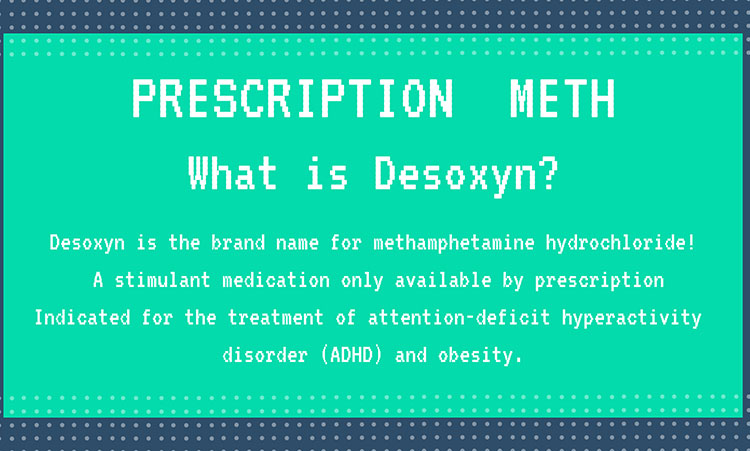
Prescription Meth – Despite the media focus placed on the opioid epidemic in the U.S., according to recent research from the Substance Abuse and Mental Health Services Administration, there are now more addiction treatment admissions for amphetamine drugs than there are for prescription narcotics.
And according to estimates put forth by the National Institute on Drug Abuse, as many as 30% of illicitly made stimulants in the U.S. are diverted for recreational (non-medical) purposes. This fact is particularly troublesome because Americans use approximately 80% of the global supply of pharmaceutical stimulants.
Prescription Meth: What Is Desoxyn?
Desoxyn is the brand name for methamphetamine hydrochloride, a stimulant medication only available by prescription and indicated for the treatment of attention-deficit hyperactivity disorder (ADHD) and obesity. Although it only occasionally has a legitimate medical purpose and is not as popular as other medications such as Adderall or Ritalin, it is still prescribed commonly enough to be of concern. According to the Drug Enforcement Administration, an estimated 16,000 prescriptions for Desoxyn are filled annually.
Prescription Meth as a Drug of Abuse
This is Desoxyn’s official product warning: “Administration of methamphetamine for prolonged periods of time in obesity may lead to drug dependence and must be avoided. Particular attention should be paid to the possibility of subjects obtaining methamphetamine for non-therapeutic use or distribution to others…”
Chemically, Desoxyn is nearly identical to illegal street meth. As such, it has an extremely high potential for abuse, tolerance, dependence, and addiction. It can be nabbed from medicine cabinets and sold for its intensely pleasant and stimulating effects.
Most people may think of ADHD as a condition diagnosed primarily among youth, and it frequently develops among adults as well. In fact, as recently as 2014, nearly 58% of prescriptions for stimulants were written for adults.
The abuse of prescription stimulants is more common than one might think, especially among college-aged adults. For instance, 62% of students in their four years at college report, as some point, being offered an ADHD medication for non-medical purposes.
Prescription Stimulant Abuse
Unfortunately, nearly 1 in 3 college students will misuse an ADHD drug at some time during their undergraduate career – and 9 out of 10 who use these medications admit to feigning their symptoms to receive a prescription. This is an enormous problem because the long-term misuse of ADHD medications results in significantly-elevated rates of dependence and addiction.
Most – nearly 90% – of people who take excessive doses of prescription stimulants suffer from withdrawal symptoms within 24 hours of the last use, and these uncomfortable symptoms can persist for days or weeks. The desire to avoid withdrawal symptoms often compels users to continue using substances rather than try to quit.
Weight Loss and Desoxyn Abuse
When considering Desoxyn’s potential for addiction, its use as a weight-loss supplement cannot be ignored. Desoxyn is prescribed for obesity, and although it does help some patients shed pounds, it is only slightly more effective than a placebo. In fact, most of the resulting weight loss occurs during the first few weeks of use and then gradually slows thereafter.
The exact mechanism by which Desoxyn appears to foster weight loss isn’t fully understood. Studies have not yet determined if the medication helps merely by suppressing the appetite, or if there is some other property of the drug that plays a role. Because Desoxyn is supposed to be used in conjunction with other health disciplines such as diet and exercise, it could be that weight loss is essentially due to multiple interventional lifestyle changes.
However, some believe that Desoxyn is either primarily or solely responsible for their weight loss, so they ask their physician for more refills or higher doses. This behavior can result in dependence, abuse, and addiction to Desoxyn.
Prescription Meth Can Lead to Illicit Meth
The American Society for Addiction Medicine finds that 80% of heroin addicts began their habit after first misusing prescription opioids. Most of those surveyed stated that they switched to heroin because prescription painkillers were “more expensive and harder to obtain,” and the same could be true for Desoxyn and illegal meth
When a person dependent on Desoxyn is unable to obtain any more refills legally, they may turn to the black market, where the price per-pill can be inexpensive and the supply variable. Conversely, illicit street meth is always available and is remarkably inexpensive.
Treatment for Meth Addiction
If you find yourself grappling with an addiction to Desoxyn, it is critical to seek specialized professional care as soon as possible to improve that person’s outcome and ensure that the condition doesn’t continue to progress.
Meth addiction is a destructive and potentially life-threatening condition that is best treated using a comprehensive approach that includes psychotherapy, psychoeducation, counseling, and group support. Our center offers these services in both inpatient and outpatient formats.
You can reclaim your life and experience the harmony and wellness you deserve! Contact us now to find out how we can help!